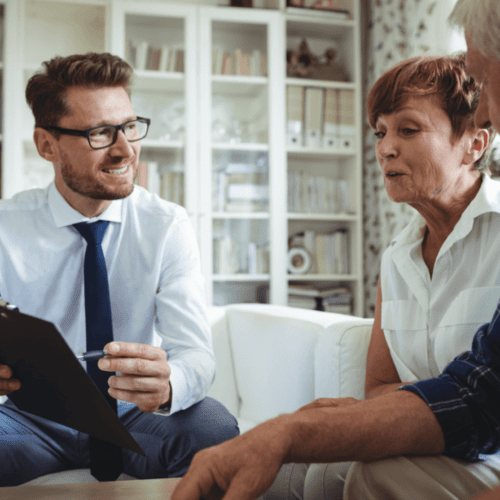Retire like a genius. How to become a reverse mortgage genius? There’s over 20 trillion dollars of home equity value in the United States for the vast majority of seniors the value of their home is their single greatest asset and represents most of their net worth. One way to access this equity is to sell the home to realize that value but another option is to remain in the home and access the equity as needed through a home equity conversion mortgage otherwise known as a reverse mortgage. A reverse mortgage is a form of home equity loan backed by the federal housing administration that allows a homeowner age 62 or older to borrow against their home on a tax-free basis. Reverse mortgages allow access to home equity without requiring the borrower to make monthly payments on the loan because there are no required monthly payments on a reverse mortgage fees and the interest is added to the loan balance each month. The payment of the loan is deferred until the homeowner dies, sells, or moves out of the home as their primary residence. Interest rates can be variable and tend to be higher than a bank loan or mortgage but the trade-off is the flexibility to not make monthly payments as long as the home remains the primary residence. Reverse mortgages are typically used to help seniors supplement retirement income, cover costs of health care and home care ,or to make needed home improvements. People should resist the idea of using the funds for frivolous expenditures. The funds from a reverse mortgage can be taken by the borrower as a lump sum, monthly income, or a line of credit can be established to be drawn down on an as needed basis. But the borrower will still be responsible for property taxes, homeowners insurance, and property maintenance. Although a reverse mortgage is not considered income for tax purposes it can have an impact on federal entitlement benefits such as Social Security and Medicaid so it’s important to understand how this could impact the borrower before securing the loan. Retire like a genius. It’s always best to work with information and experts to help you navigate these tricky issues so visit retirement genius today to learn more about how to retire like a genius.
What Is a Reverse Mortgage?
You’re in the middle of your retirement years. The last thing you want to worry about is running out of money for pressing expenses like health care, long-term care, or debt. No one should have to spend their retirement unsure of whether they have enough funds to comfortably live out the rest of their life.
That’s where reverse mortgages come in. These home equity loans allow you to channel the value of your property into liquid retirement income without having to vacate your long-time residence. Read on to uncover the different types of reverse mortgages, tax implications, and everything else you need to begin an exploration of this complex financial topic.
How Does a Reverse Mortgage Work?

A reverse mortgage is a home equity loan that allows homeowners to tap into the liquidity of their property—one of many seniors’ most valuable assets—while they continue to live there. Though you have probably heard of home equity loans that use the home as collateral, reverse mortgages operate very differently.
While the homeowner in a traditional mortgage pays the lender in installments, the lender in a reverse mortgage pays the homeowner for the life of the loan. The ability to opt-out of monthly loan repayments is one of the many advantages for homeowners who pursue a reverse mortgage.
Seniors who choose this option will not have to worry about adding to their monthly expenses as the whole sum of the loan and its accumulated interest will be repaid only at loan maturity—when the homeowner dies, moves to a new residence, or sells their house. However, they will have to keep their home in good condition for the life of the loan, not only making necessary home repairs, but paying all taxes and homeowners insurance fees.
In retirement, when many seniors’ incomes are fixed, reverse mortgages provide an extra financial cushion to help cover any unexpected retirement costs, healthcare needs, home improvements, or in-home care. See what a reverse mortgage can do for your retirement finances.
- Reverse mortgages allow you to supplement your retirement income using your home equity without having to change residences.
- Homeowners can use their borrowed funds on any expense they choose, though seniors usually spend them on pressing expenses like long-term care or outstanding debt.
- Because reverse mortgages require the homeowner to maintain the home as their primary residence, this type of loan is best for seniors who want to spend their retirement in a beloved home.
- Reverse mortgages allow homeowners to opt out of monthly loan payments, meaning seniors will not have to cope with additional retirement expenses.
Who Qualifies for a Reverse Mortgage?
Age 62+
Homeowners must be at least 62 years old to qualify for any type of reverse mortgage.
Primary Residence
Homeowners must live in the home used as loan collateral for the life of the reverse mortgage.
Home Upkeep
Homeowners must possess sufficient funds for home maintenance, insurance, taxes, and any other property fees as long as they live in their house
How does a reverse mortgage work?
Even after homeowners reach the required age for reverse mortgages and decide to pursue this type of loan, they may be left wondering how this solution works. The first step in a reverse mortgage is to decide in which form to receive money from the lender: a lump-sum payment, line of credit, or monthly income, or, if you choose an HECM, some combination of the latter two. As the loan matures and the homeowner borrows more funds, the sum of reverse mortgage payments will gather interest. Because reverse mortgages allow homeowners to opt out of a monthly payment plan, the interest rates on this type of loan are often higher than those of a primary or secondary mortgage. However, if homeowners decide to make payments to repay the loan amount before maturity, they will cut down on the funds accruing interest and the amount they owe when the loan ends.
Only when the homeowner dies, sells their home, or changes their primary residence will the total amount borrowed and its accumulated interest have to be repaid. Families of the homeowner typically pay off the loan and accrued interest through the sale of the home used as collateral in the reverse mortgage. While families can pay off the loan in some other way, they will receive a positive balance if the home’s sale value is greater than the amount owed
The loan amount you receive from a reverse mortgage will always be less than the full value of your property. This is because the funds will be used to pay for the various transaction fees associated with the process and any judgments, loans, or mortgages attached to the property. Use the Retirement Genius reverse mortgage calculator to see how much you could get out of your home equity in a reverse mortgage.
Tax Implications of Reverse Mortgages
As with any major financial decision, we strongly encourage you to carefully consider the tax implications of reverse mortgages before pursuing this path. While seniors will not receive any tax deductions for paying off their reverse mortgage, this option does come with several tax advantages.
Regardless of in which form seniors choose to receive payment, their payout from this home equity loan will not be subject to taxation, as the funds are not legally considered income. However, homeowners’ obligation to maintain their home throughout the life of the loan means you must continue paying property taxes. In addition, if you have any tax liens attached to your property, a portion of the loan will be deducted to pay off these outstanding liens.
Though the tax benefits of reverse mortgages render them attractive to many homeowners, there are several other options available to seniors who are looking to add to their retirement income. If you do not meet the reverse mortgage qualifications, home equity loans and home equity lines of credit allow you to access the market value of your home without having to sell it. Due to the required age for reverse mortgages, many qualifying homeowners will also be eligible for life settlements or the sale of eligible life insurance policies, which also possess appealing tax benefits.
Different Types of Reverse Mortgages
Broadly speaking, reverse mortgages can be divided into two categories: publicly-funded and privately-funded. Let’s take a deeper dive into each of these varieties of reverse mortgage.
The most popular type of reverse mortgage, the home equity conversion mortgage or HECM, is a federally-backed loan. To qualify for an HECM, the homeowner must have a completely paid-off mortgage and no federal debt. Because this type of home equity loan is insured by the U.S. Federal Housing Administration who only approves loans from trustworthy lenders, HECMs are arguably the most secure form of reverse mortgage. However, this high security standard comes with loan limits and extra fees.
- Homeowners with an HECM can choose between a fixed interest rate and variable interest rate on their loan.
- Under an HECM, seniors can only borrow up to a fixed cap which increases with their age and property value.
- HECMs come with several fees such as mortgage insurance premiums, origination fees, servicing fees, home inspections fees, and credit check fees.
If you need to make home improvements to accommodate a medical condition or disability, single-purpose reverse mortgages are specifically designed to help you get the funds you need. This type of loan is funded by government agencies and nonprofits and is considered as the most economic reverse mortgage option by many.
- This option is best for those with medical conditions or disabilities who need funding for accessibility accommodations to their homes.
- Though these loans do not provide the security of mortgage insurance like HECMs, this means homeowners do not have to pay mortgage insurance premiums.
- Borrowers will not have to make monthly payments on the loan’s balance, but they will have to continue paying homeowners’ insurance fees and property taxes.
Instead of receiving their backing from the government, proprietary reverse mortgages are funded by private lenders. Whereas HECMs and single-purpose reverse mortgages often place caps on the amount of money borrowers can receive from a reverse mortgage, the private lenders in proprietary reverse mortgages are not subject to the same limits. As a result, these private lenders can provide sizable principal balance loans bound by the value of the borrower’s home.
- This option is ideal for homeowners with valuable properties as its omission of lending caps means they can capitalize on the entire worth of their homes.
- Borrowers do not have to pay mortgage insurance premiums.
- This private reverse mortgage gives borrowers flexibility when it comes to their choice of lenders but lower overall security as lenders are not vetted and the loans do not come with insurance.
Key Takeaways
Though seniors may not realize it, their home is a high-value asset they can make work for them without having to sell, downsize, or cut down on their monthly expenses. When seniors need funds, reverse mortgages offer a source of cash to draw upon in their retirement. Equally important, reverse mortgages offer homeowners the security of knowing they can live out the rest of their years in a home they love.
Whether considering this option for yourself or a senior close to you, it is important to thoroughly examine the mechanics of reverse mortgages before committing to this financial decision. Even if you do not yet meet the reverse mortgage qualifications, we recommend discussing your options with a professional. As you go about your investigations, consider the following takeaways about this powerful home equity loan.
- If you need funds to stay in a cherished house for the duration of your retirement, a reverse mortgage can help you fund a life in your home.
- The money seniors receive from a reverse mortgage will not be subject to taxation.
- Borrowers can receive the value from their home in the form of a lump sum payment, monthly income, or line of credit.
- As reverse mortgages are usually paid off through the sale of the home, this option is best for those who do not intend to pass down a family home to the next generation.
- Seniors do not have to make monthly loan payments if they choose.
- You can use the funds from a reverse mortgage on anything you wish, though they are best spent on essential costs like home improvements, health care, and debt.
- The loan amount you receive for a reverse mortgage will accumulate interest at a relatively high rate for the life of the loan.
View Transcript



